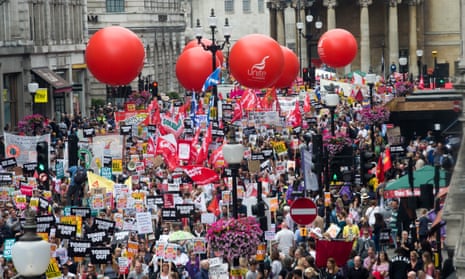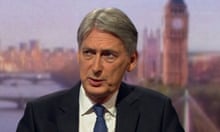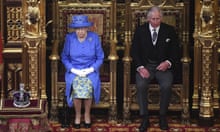Philip Hammond will have to rip up the government’s deficit reduction plan or increase taxes for most of the population if he decides to end seven years of austerity by sanctioning higher public sector pay, reversing welfare cuts and providing extra cash for Whitehall departments, a thinktank has said.
The Resolution Foundation said it was possible for the chancellor to do a U-turn in his autumn budget, but only if he was prepared to increase borrowing by more than £100bn over the next four years or to make individuals and companies pay more tax.
Its report, Living With Austerity, said that given the curbs on spending since 2010 it was understandable that politicians would want to revisit the debate, but that they had to face up to the costs involved.
Theresa May’s failure to win an overall majority in last month’s general election has led to many leading Conservatives – including the foreign secretary, Boris Johnson, health secretary Jeremy Hunt and the education secretary Justine Greening, suggesting that the time has come to abandon the 1% cap on public sector pay.
Hammond has been resisting calls for a more generous approach to public sector workers and has insisted that the government stick to its plan of eliminating the budget deficit by midway through the 2020s.
The Resolution Foundation said public sector pay was only a small part of austerity, and that removing the 1% cap would amount merely to tinkering. Its analysis found that the public sector was facing two “crunches”, a squeeze on pay that would bring it back to 2005 levels by 2020 and a loss of jobs that would result in a headcount below five million for the first time this century.
The report said allowing public sector pay to rise in line with pay in the private sector for the rest of the decade would cost £9.7bn by 2021-22, while expanding the public sector workforce in line with the increase in the UK’s population would cost a further £11.5bn over the same period.
Far more households are affected by the freeze on benefits than by the public sector pay cap, but the foundation said the cost of unfreezing them would be lower. Allowing working age benefits to rise in line with inflation from next April would cost £3.6bn by 2021-22, while reversing the cuts to work allowances in universal credit would cost around £3.2bn.
Since 2010, only the NHS, international development and schools have been spared budget cuts. The report said allowing departmental spending (including public sector pay) to rise in line with GDP growth after the end of the current spending review in 2019-20 would cost £12.3bn by 2021-22. Reversing the cuts planned for the next two years would cost a further £11bn.
Matt Whittaker, chief economist at the Resolution Foundation, said it was no surprise that squeeze fatigue had set in. “But recognising that fatigue is very different to doing something about it. If we want a serious discussion on ending austerity, we need to get serious about prioritising what spending we really want to see rise and how we want to pay for it – and that means tax rises for most of us.
“The chancellor can start by cancelling unneeded corporation tax cuts. But if he wants to raise serious revenues despite the challenges of having a minority government, which the Office of Budget Responsibility may force him to irrespective of plans to end aspects of austerity, then he could look at freezing tax thresholds, which could raise up to £12.5bn.”
The foundation said weaker than expected economic expansion and pay growth this year meant there was a significant risk that the independent Office for Budget Responsibility would downgrade its forecasts for the public finances in the budget. The chancellor would need to respond to these development even before any moves to “end austerity”, it added.









Comments (…)
Sign in or create your Guardian account to join the discussion